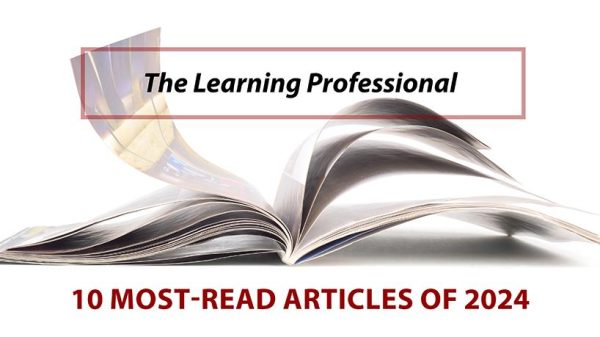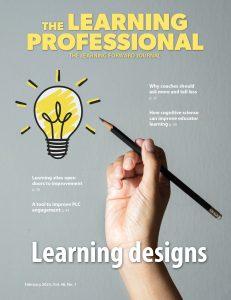Each year, The Learning Professional team announces a slate of themes for the following year’s issues. We consider the field’s pressing needs, members’ roles and interests, and emerging research. We also look for areas where our staff and readers have unique insights to share.
The Learning Professional themes speak to urgent issues facing the education field at large, homing in on how professional learning can help educators at every level meet those big challenges. They speak directly to professional learning leaders, while also addressing a broader audience of leaders and scholars whose support is a vital part of the professional learning ecosystem.
In 2023, issues will focus on addressing the needs of educators and students during these tumultuous times, as we all continue to recover from the Covid pandemic, reckon with racial inequity, navigate teacher shortages, and more.
We will go beyond the rhetoric about learning loss to look at how professional learning can help educators accelerate learning and support students with special academic, social, and emotional needs.
We will dive into the worsening teacher shortage and looming exodus of principals and superintendents to look at strategies for recruiting, retaining, and supporting educators in ongoing, meaningful ways. Toward the end of the year, we will build on that topic to examine how professional learning can support educators in taking their next career steps – a process that can, in turn, build a stronger and more stable workforce.
We will also look closely at a source of perennial stress contributing to the challenges described above: finding the time to do everything that is needed and worthwhile. We’ll examine time-tested and innovative strategies for dedicating sufficient time for educators to learn and grow so their students can learn and grow.
We are honored to be partnering with the Bill and Melinda Gates Foundation to produce an issue about continuous improvement in schools. Building on our longstanding commitment to improvement cycles in professional learning, this issue will highlight stories and findings from the foundation’s Networks for School Improvement and their grantee partners.
All of these issues will be grounded in the recently revised Standards for Professional Learning. In keeping with our goal of building knowledge about the new standards, we will prioritize articles that address equity, leadership, and high-quality curriculum and instructional materials, as well as the long-established standards on collaborative inquiry, learning designs, implementation, evidence, and professional expertise.
The specific themes and their descriptions are listed below, along with submission deadlines. You can find guidelines for authors, submission instructions, and more information in the Write for Us section of our website.
We are excited to bring these topics to life with stories, examples, tools, and strategies, but we can’t do that without our readers. We encourage you to submit ideas for articles and spread the word to your networks. We hope you’ll help us share best practices and build a movement of high-quality professional learning for all. Below are the themes for all six The Learning Professional issues publishing in 2023:
February 2023: The retention challenge
An alarming number of teachers and leaders are exiting the field, leaving schools understaffed, students underserved, and educators feeling unfulfilled in their chosen profession. How do schools and systems provide the support educators need to stay connected and engaged? How does investing in professional learning and educator growth support retention, career growth, and a stable and successful workforce? This issue will look at how educational systems are providing their teachers and leaders with the instructional, logistical, financial, social and emotional, and other supports they need to remain in the field and benefit students for the long-term. Submission deadline is Nov. 1, 2022.
April 2023: Continuous improvement in schools
Networks for School Improvement provide powerful opportunities for teams of educators to learn and work collaboratively to achieve school and student goals. These networks engage in cycles of continuous improvement that align with Standards for Professional Learning and involve setting goals, designing intervention strategies, reviewing data, reflecting on progress and challenges, and making adaptations based on their learning. This issue will examine how Networks for School Improvement function, what they’re learning, and how they are making a difference for schools and students. This issue will be produced in partnership with the Bill & Melinda Gates Foundation. Manuscript submission is by invitation only.
June 2023: Accelerated learning
The Covid-19 pandemic left many students with unfinished learning, and students are still behind where they would normally be for their age and grade levels. This is especially true for students with the highest needs and those farthest from opportunity. While policymakers push for schools to play catch up, educators grapple with learning gaps that predate the pandemic. High-quality professional learning is essential for building educators’ capacity to understand and meet each student’s needs – academic, social, and emotional. This issue will examine how professional learning enables teachers to assess students’ needs, engage in differentiated instruction, accelerate learning for students farthest behind, and implement effective strategies for academic recovery and advancement. Submission deadline is Feb. 1, 2023.
August 2023: It’s about time
Time is an essential resource for professional learning, and the most frequently asked questions about professional learning center around finding time to ensure that job-embedded, collaborative learning makes a difference for teaching and student learning. Often, we hear educators ask, “How do we find time in our busy schedules for professional learning?” “How many hours of professional learning do we need to make a difference?” “Is it better to do several days of intensive collaborative learning or spread it out?” “How do we allocate time so that professional learning is ongoing, job-embedded, and linked to school improvement goals instead of a series of one-off events?” This issue will examine these and other questions about time. Articles might address the logistics, policies, mindsets, and values around time for professional learning. Submissions might involve tools and commentaries as well as full-length articles. Submission deadline is April 1, 2023.
October 2023: Supporting students with special needs
All educators need to know how to support students with a range of needs, particularly given the stresses and setbacks of the past couple of years. This issue will look at how high-quality, standards-based professional learning gives teachers, administrators, and professional learning leaders the knowledge and tools to meet the needs of students with special academic, social, and behavioral needs. Topics of interest include what all educators need to know about identifying and supporting students with special needs; special educators’ unique professional learning needs; empowering special educators as professional learning leaders for their general education colleagues; and how learning professionals can apply models and insights developed for special education to supporting all teachers and students. Submission deadline is June 1, 2023.
December 2023: The next career step
In an ideal system, professional learning supports educators across the career continuum, from their first days in the classroom to deepening practice to developing leadership capacity. This issue will explore how professional learning helps educators navigate their career development and serve students with equity and excellence as they progress in the profession. Topics of interest include strategies to mentor and support teachers to explore administration and central office positions; opportunities for teachers to grow in the profession without becoming administrators; balancing current responsibilities with goals for the future; and how developing next-level skills can help educators deepen and broaden their impact on student learning and success. Submission deadline is Aug. 1, 2023.









